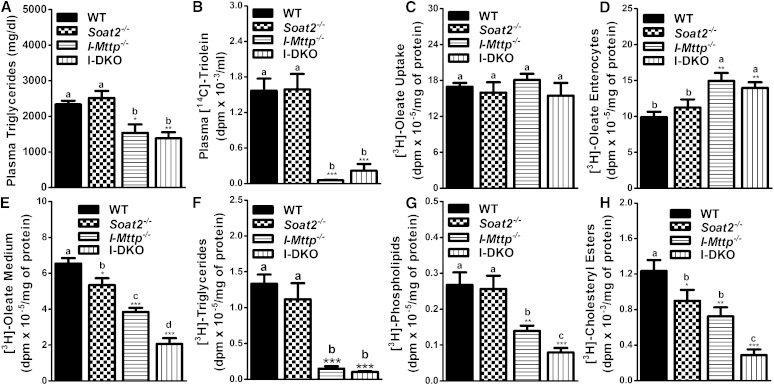Fig. 2.
Intestinal MTP and global ACAT2 gene deletions decrease lipid absorption. Twelve-week-old WT, Soat2−/−, I-Mttp−/−, and I-DKO male mice (n = 3) were fasted overnight and injected intraperitoneally with P407 (30 mg/mouse). After 1 h, mice were gavaged with 0.5 μCi of [14C]triolein, as well as 0.2 mg of cholesterol, in 15 μl of olive oil. Plasma was collected after 2 h to measure triglyceride mass (A). Total plasma was also used to measure radioactivity to determine the absorption of [14C]triolein (B). To study lipid uptake, enterocytes were isolated from 12-week-old chow diet-fed overnight-fasted mice, and incubated with 0.5 μCi/ml of [3H]oleate. After 1 h, enterocytes were washed and lipids were isolated to determine uptake of radiolabeled fatty acid (C). For characterization of secreted lipoproteins, after 1 h of [3H]oleate uptake, enterocytes were washed and incubated with fresh media containing 1.4 mM oleic acid containing micelles for 2 h. Isolated lipids from the cells (D) and media (E) were counted to determine total fatty acid-derived radioactivity. Lipids were extracted from the media and separated by thin layer chromatography to determine radioactivity in triglycerides (F), phospholipids (G), and cholesteryl esters (H). Each measurement was done in triplicate with three mice per group. These data are representative of two separate experiments. Data are presented as mean ± SD. Data in (C–H) are normalized to cellular protein. *P < 0.05, **P < 0.01, and ***P < 0.001 compared with WT as determined by Student’s t-test. Statistically significant differences in different parameters in the four groups were evaluated by one-way ANOVA with Newman-Keuls multiple comparison test. Different letters above bars indicate statistically significant differences (P < 0.05) as determined by one-way ANOVA.

